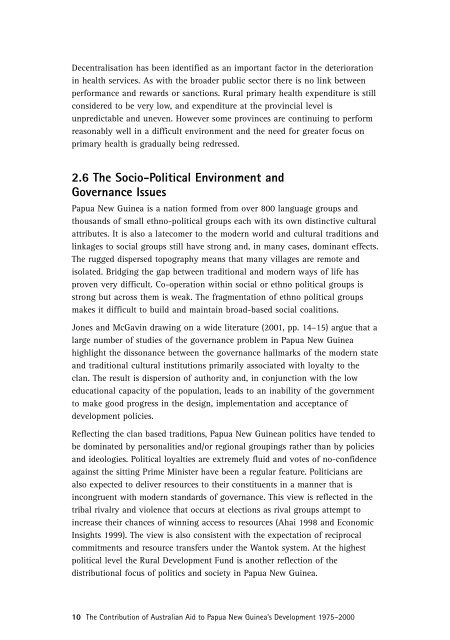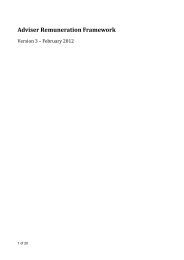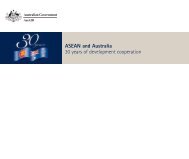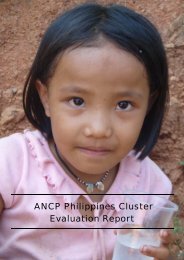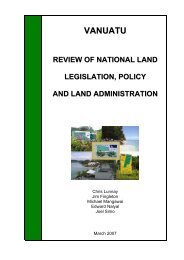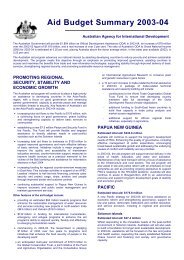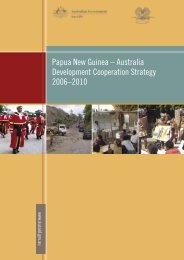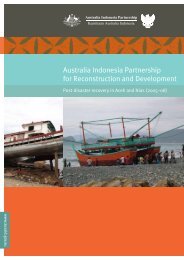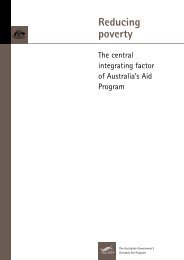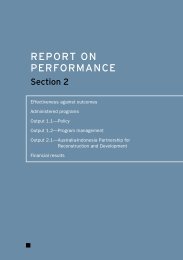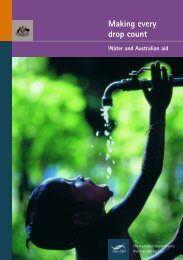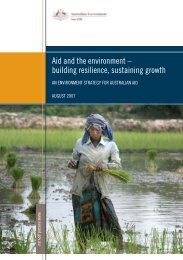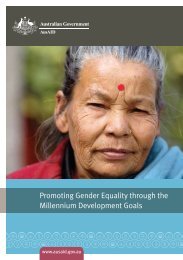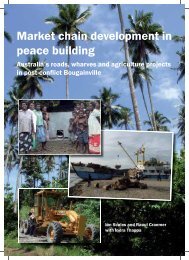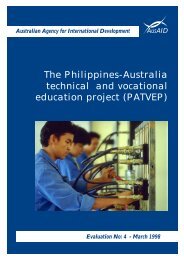Australian Aid to PNG - AusAID
Australian Aid to PNG - AusAID
Australian Aid to PNG - AusAID
Create successful ePaper yourself
Turn your PDF publications into a flip-book with our unique Google optimized e-Paper software.
Decentralisation has been identified as an important fac<strong>to</strong>r in the deteriorationin health services. As with the broader public sec<strong>to</strong>r there is no link betweenperformance and rewards or sanctions. Rural primary health expenditure is stillconsidered <strong>to</strong> be very low, and expenditure at the provincial level isunpredictable and uneven. However some provinces are continuing <strong>to</strong> performreasonably well in a difficult environment and the need for greater focus onprimary health is gradually being redressed.2.6 The Socio-Political Environment andGovernance IssuesPapua New Guinea is a nation formed from over 800 language groups andthousands of small ethno-political groups each with its own distinctive culturalattributes. It is also a latecomer <strong>to</strong> the modern world and cultural traditions andlinkages <strong>to</strong> social groups still have strong and, in many cases, dominant effects.The rugged dispersed <strong>to</strong>pography means that many villages are remote andisolated. Bridging the gap between traditional and modern ways of life hasproven very difficult. Co-operation within social or ethno political groups isstrong but across them is weak. The fragmentation of ethno political groupsmakes it difficult <strong>to</strong> build and maintain broad-based social coalitions.Jones and McGavin drawing on a wide literature (2001, pp. 14–15) argue that alarge number of studies of the governance problem in Papua New Guineahighlight the dissonance between the governance hallmarks of the modern stateand traditional cultural institutions primarily associated with loyalty <strong>to</strong> theclan. The result is dispersion of authority and, in conjunction with the loweducational capacity of the population, leads <strong>to</strong> an inability of the government<strong>to</strong> make good progress in the design, implementation and acceptance ofdevelopment policies.Reflecting the clan based traditions, Papua New Guinean politics have tended <strong>to</strong>be dominated by personalities and/or regional groupings rather than by policiesand ideologies. Political loyalties are extremely fluid and votes of no-confidenceagainst the sitting Prime Minister have been a regular feature. Politicians arealso expected <strong>to</strong> deliver resources <strong>to</strong> their constituents in a manner that isincongruent with modern standards of governance. This view is reflected in thetribal rivalry and violence that occurs at elections as rival groups attempt <strong>to</strong>increase their chances of winning access <strong>to</strong> resources (Ahai 1998 and EconomicInsights 1999). The view is also consistent with the expectation of reciprocalcommitments and resource transfers under the Wan<strong>to</strong>k system. At the highestpolitical level the Rural Development Fund is another reflection of thedistributional focus of politics and society in Papua New Guinea.10 The Contribution of <strong>Australian</strong> <strong>Aid</strong> <strong>to</strong> Papua New Guinea’s Development 1975–2000


